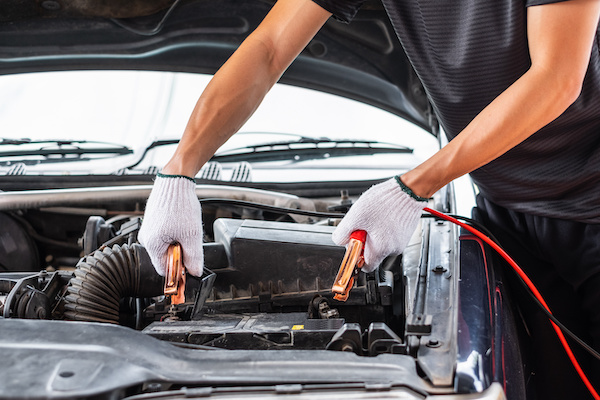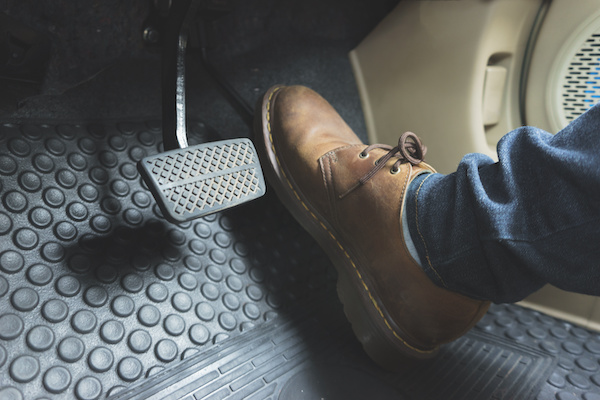Posted on 2/17/2023

Jump-starting a car is a useful skill to have in case your vehicle's battery dies or you find someone that needs help. If you don't know the correct way of jump-starting a vehicle, you are in the right place - it's simple but you have to keep a few things in mind. Follow these steps to safely and effectively jump-start a car: Step 1: Get the Right Equipment You will need a set of jumper cables and a second vehicle with a working battery. Make sure the batteries have the same voltage (usually 12 volts). Step 2: Position the Vehicles Park the second vehicle close enough to the dead vehicle so that the jumper cables can reach both batteries but not so close that the vehicles are touching. Make sure both cars are in park or neutral and the parking brake is engaged. Step 3: Connect the Cables Connect the red cable to the positive (+) terminal on the dead battery, then connect the other end of the red cable to the positive terminal on the working battery. Next, connect the ... read more
Posted on 1/30/2023
.jpeg)
If you’ve ever seen a dark puddle pooling underneath your parked car, don’t take it lightly or move on from it. There’s a good chance that it is your engine oil leaking from your car. Oil leaks are quite easy to spot, and they can cause major engine damage if left unnoticed. When you have an oil leak, there is no better place to bring your car than Bud’s Auto Repair and Transmission. How Oil Leaks Happen Oil leaks can happen for a number of reasons. They include – Damaged Oil Pan - The oil pan can be found underneath most cars. You should take care of your undercarriage because driving on rough terrain can wear and tear your oil pan. If something strikes the pan hard enough, it can cause oil to seep out. Worn Drain Plug - The drain plug is a part of the oil pan, and it is used to get rid of all the old oil before adding new motor oil to your car. The plug can get worn over time and even break, causing oil to leak out ... read more
Posted on 12/30/2022
.jpeg)
Diesel engines are designed to run for long periods with little or no maintenance. However, there are a few things you can do to keep your diesel engine running smoothly and efficiently. Here are some maintenance tips for diesel engines: Change The Engine Oil and Filter Regularly This will help remove any dirt or debris that could clog up the engine. Changing the oil and filter regularly is an important part of maintaining a diesel engine. Diesel oil breaks down faster than other types of oil, so it needs to be changed more frequently. Additionally, the filter catches any impurities in the oil, and over time it can become clogged. Regularly changing the oil and filter helps to keep the engine running smoothly and efficiently. Check The Air Filter Regularly and Replace It If It Is Dirty A dirty air filter can restrict airflow and reduce engine performance. Diesel engines are known for their durability and reliability. However, like all engines, they require regular maintenance to k ... read more
Posted on 11/30/2022

When you hear suspicious noises coming from your vehicle, you might be tempted to shrug it off. But if it is recurring, you should probably get it checked out. Automobiles should not make any unusual noises with normal operations. Such noises can indicate engine problems, brake problems, or more. In this blog, we will discuss the top 5 concerning car sounds and what they mean. Popping When Turning Vehicle This sound can indicate troubles with front- and all-wheel drive vehicles. This noise indicates an axle problem, specifically with constant velocity joints (CV joints). Any signs of snapping, clicking, or popping sound during a turn should signal you to have your drive axles checked. Chirping or Squealing From Under the Hood Engine squealing during acceleration can commonly be attributed to a worn or loose belt. You should bring your car to Bud’s Auto Repair and transmission to have your vehicle’s belts checked and potentially repl ... read more
Posted on 10/28/2022

Brakes are an essential part of your vehicle's control system. Therefore, an effective brake pedal should feel firm. However, your car should be checked immediately by your trusted mechanic to diagnose the issue if it feels spongy. Spongy brakes are not only frustrating but also dangerous. Here is what could make your brake system feel spongy. 1. Air in The Brake System Low brake fluid and the overheating caliper can lead to evaporation of the brake fluid and consequent air build-up in the brake system. Besides, when the bleeder valve is loose, your brake fluids can absorb moisture. The air bubble in the brake system can prevent the brake fluid from flowing correctly and compromise your brake system's hydraulic pressure. It would be best if you always flushed the brake fluid to remove air from the brake system. 2. Contaminated Brake Fluid Most drivers do not know what can contaminate the brake fluid. Debris and rust in the system, for one, is the primary contaminant. Rust ... read more